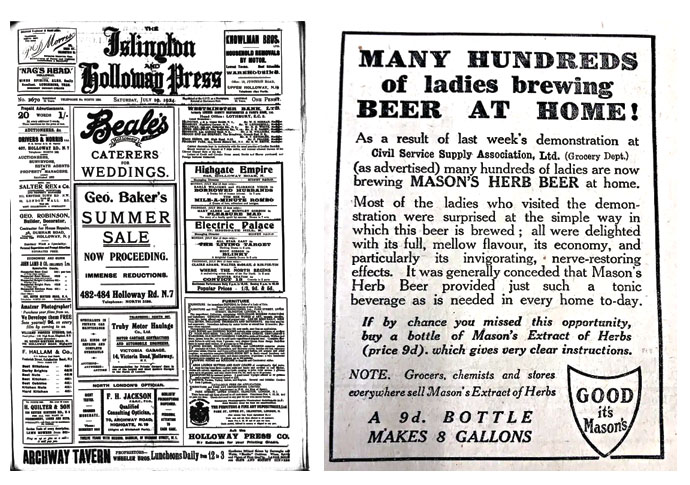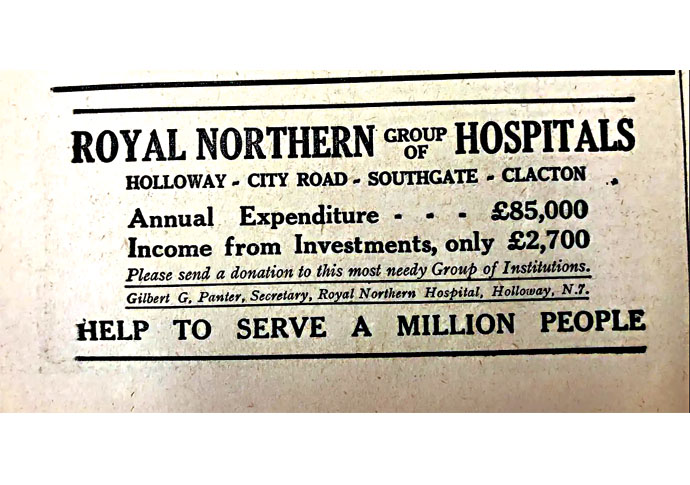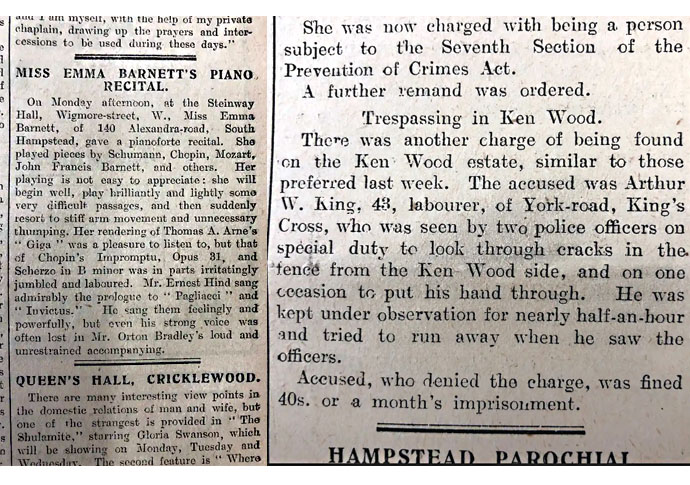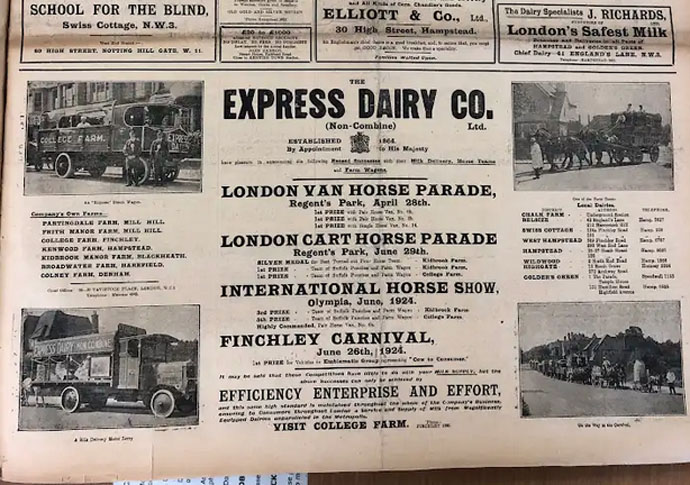All our yesterdays
Dan Carrier looks back a century to July 1924 – before television and the internet – when people’s only source of information came in black and white on newsprint
Thursday, 11th July 2024 — By Dan Carrier

Cuttings from a century ago, including the front page of the Islington & Holloway Press with a display of advertisements; news of ‘ladies brewing beer at home’
JULY 1924 – 100 years ago this week Harold Abrahams, the sprinter who faced anti-Semitic abuse, won gold at the Paris Olympics. Londoners were excited to see the Pageant of Empire: A Historical Epic, a giant exhibition held at the Empire Stadium, Wembley. Technology made headlines as a photograph was sent electronically across the Atlantic for the first time.
Not so successful was inventor Harry Grindell Matthews, who was told by the War Office they were not going to buy his patent death ray. The new Labour government, like the one elected last week, was looking at the planning system, and decided the best way was to appoint the Royal Fine Art Commission to advise.
This was Camden in the post-Great War world, a mix of the Roaring Twenties and poverty.
This week I presented a lecture for the Camden History Society which focused on how papers like our own are primary sources for historians.
One of the privileges of working for the New Journal is the feeling that today’s news is tomorrow’s history. And 100 years ago, there were fewer forms of the primary sources we can access today, and a very different newspaper industry.
It was truly a golden age. Radio and newsreels were limited. Instead, the printed daily told you what was going on, where you bought and sold goods and services, and all manner of other information.
Our newspaper has its origins in 1872 with the Holloway Press. We competed for attention on newsstands with hundreds of titles, including Hampstead News, The Holborn Guardian, Islington Guardian and Hackney News, North London Halfpenny, The St Pancras Chronicle and People’s Advertiser, The Camden and Kentish Towns Reporter, and the marvellously titled Trotting World and Horse Review, printed in NW5.

A plea for funds from Royal Northern Hospitals
Looking through archives lights up a world long gone, but still so recognisable.
Newspapers carried a front page of adverts: the Ham & High of Saturday July 12 saw Express Dairies promote the London Van Horse Parade in Regent’s Park. It shows how the working horse was part of London culture, with milk delivered by horses based in Kenwood. Sidney Day, whose memoir London Born describes working-class life, recalls the Kenwood horses were so tame that youngsters would ride them bareback.
While horses were a mainstay for trade, transport was changing. Garages, petrol sales – and road changes – are everywhere. Public transport is undergoing a revolution: the LCC has a new tram service that will take you from Highgate to the Elephant and Castle for 2p, while the London General Omnibus Company produced a “beautifully printed map” of 109 routes out of London, free to collect from bus conductors.
The Holloway Press editor grumbled about being held up at the Nag’s Head by a “congregation of bassinets, whose owners have coolly monopolised the pavement”. He said he was “inclined to hit out right and left: The Nag’s Head has lately become a very crowded centre, and the trouble increases daily at the Archway terminus.”
Life on the domestic front is illustrated by an advert that tells us that “many Hundreds of Ladies are brewing beer at home! A kit for Masons Herb Beer costs 9p. It has invigorating properties and nerve restoring effects.”
The skills of Somers Town mothers were celebrated. Four mums and one dad from Chalton Street “were adjudged the best of the 350,000 who entered the Schools for Mothers Challenge Shield”. Tested on “sewing, cooking, general ingenuity and writing an essay on mothercraft,” Mrs Ludlow knitted a frock that cost 2 shillings, while the prize-winning father, Mr Long, made a chair that unfolded into a bed.
We get an idea of what life was like before the NHS. The Royal Northern Hospitals – in Holloway Road and City Road – tell us they serve more than a million people, they spend £85,000 annually and have an income from investments of £2,700.

A less-than-favourable recital review; a trespass in Ken Wood
Over in the Hampstead papers, children could be found in an Edwardian version of a Forest School. “Tomorrow the Sun Bathing Centre, organised by the Sunlight League, will be opened at Ken Wood,” one story informs us.
“They will be taught breathing exercises and gymnastics and they will play games or lie on ground sheets while sun rays play on their bodies.”
They report on the funeral service of English folklorist Cecil Sharp, and advertise scores of dance teachers. Winifred Rose of Daleham Gardens offers Greek Dancing, her rival Miss Edith Bishop in Quex Road boasted of an “artistic hall, good floor, excellent music” for her classes in the “latest Waltz, Fox Trot, Tango, Juvenile Ballroom”.
And for budding Liza Doolittles, Frognal’s Dorothy Wood focused on Elocution and Dramatic Art, with “voice production a speciality”.
We have an insight into other leisure pursuits: under Pottery and Design, we learn Miss Beatrice Wadham, of Downshire Hill, “has taken some clay from Hampstead where the roads are being excavated and has succeeded in producing a number of articles”.
Not all reviews were as kind. Miss Emma Barnett of South Hampstead gave a piano recital and was said to be “not easy to appreciate: she will begin well, play lightly some difficult passages and then suddenly resort to stiff arm movement and unnecessary thumping”.
The Hampstead papers reflected the interests of a well-to-do readership, while our predecessor covered the working-class neighbourhoods. The number of obituaries for workers in the National Union of Railwaymen shows how many readers were employed at mainline train stations. The adverts for pianos reveals how many parlour musicians there were.

A notice of Express Dairy Horse Parades
Our radical past is apparent. One columnist wrote: “At the commencement of [Ramsay] Macdonald’s premiership, he delighted the harassed housewife by stating he would smash the rings and combines. Why did he make this bold assertion if it was an impossible task? Fleecers of the poor are flourishing…”
An almighty row in Islington North between the left and right of the Labour Party was in full cry. We ran a letter from AB Elsbury about a disrupted branch meeting. “Constant heckling on the part of one or two individuals can only by the wildest stretch of imagination be declared to be indulging in ‘violent obstructionist tactics’,” he wrote.
“This ‘strong and united organisation’ is a minority breakaway from the North Islington Labour Party.”
We were embedded in our community. We covered help for orphans of soldiers killed in the Great War, reporting that “260 ex-Servicemen’s children were given a splendid treat” when Pearly Kings and the British Legion provided tea and a conjurer.
Petty crime, driven by poverty, was covered in depth. We learn of a butler who pinched £250 worth of furs and jewellery and sold the goods on to a furrier in Upper Holloway. They got hard labour.
The St Pancras Chronicle reports on a trespasser in Kenwood and highlights how break-ins to the grounds are frequent. In this case, labourer Arthur King from King’s Cross was fined 40 shillings.
Kenwood was stocked with game birds and the Heath was a source of food for the working classes of Camden. Mr King was looking to poach something for his table.
A common crime was street gambling. Scores were arrested every week and papers printed their names, addresses and occupations. Drink as ever caused issues: one man charged with drunkenness told the court: “I am 75 and the drink runs down to my legs quicker than it did a score of years ago.” Another sad case saw a report of a “wild eyed fellow” walking up Holloway Road, knocking hats off heads and pipes from mouths.
Finally, football news. We are told that Tottenham’s balance sheet showed they were £1,476 in the red, caused partly by postponements, but also because of a poor FA Cup run.
“It would have been put right if the Spurs had another Cup round to its credit,” we wrote.
Such windows into our past are both interesting and important. As historians say, “if we don’t know where we have been, how do we know where we should be going?” and your local paper is as good a place as any to start.
• Coming soon: Untold London – a New Journal online channel on the capital’s history